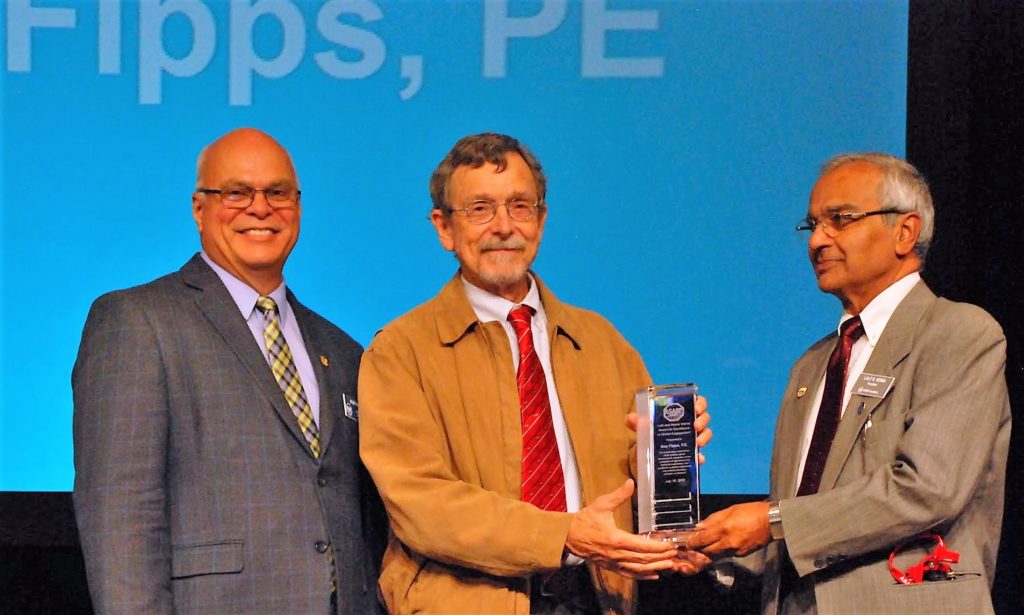AgriLife Extension specialist awarded Verma Award for Excellence in Global Engagement

- Writer: Adam Russell, 903-834-6191, adam.russell@ag.tamu.edu
- Contact: Dr. Guy Fipps, 979-845-7454, g-fipps@tamu.edu
COLLEGE STATION – Guy Fipps, Ph.D., Texas A&M AgriLife Extension Service irrigation engineer, College Station, recently received the 2019 Lalit and Aruna Verma Award for Excellence in Global Engagement.
The Lalit and Aruna Verma Award for Excellence in Global Engagement recognizes outstanding contributions made towards global advancement and recognition of the profession of agricultural and biological engineering, and excellence in global engagement and international education, outreach, and/or research.
Fipps was recognized for his long-term commitment and strong contributions to the transfer of technology of agricultural and biological engineering to improve livelihoods, food security and political stability around the world. He has supported numerous U.S. Agency for International Development projects, and the reach of his work has been wide and effective, according to the award biography.
“It’s always nice to be recognized for your work,” Fipps said. “It’s gratifying because it doesn’t happen for many of us in the field very often.”
The award was presented at the International Meeting of the American Society of Agricultural and Biological Engineers, ASABE, in July in Boston.
Fipps has been an AgriLife Extension irrigation engineering specialist for three decades and is also a professor in the Department of Biological and Agricultural Engineering at Texas A&M University in College Station.
His career has included development of the irrigation and water framework for the Inma Project in Iraq, drip irrigation for small landholders in Tanzania, trainings and technical assistance to the Iraqi government on center pivot design, GIS tools for water planning and management, and development of an irrigation modernization plan for the National Irrigation Commission of Jamaica.
Fipps served as the senior advisor for water at the U.S. embassy in Afghanistan where he conducted strategic analysis and water planning. There, he was instrumental in creating a national water agency, negotiated the first water treaty between Afghanistan and Tajikistan, and developed the principles for transboundary water policy, which the country still uses in international negotiations.
Fipps is a 31-year member of ASABE and has been an active participant in the organization’s Natural Resources and Environmental Systems Irrigation Group as well as among other ASABE award committees and organizing groups.
He is author or coauthor of more than 200 extension, professional journal and conference proceeding papers in addition to other publications. Throughout his career, Fipps has received many awards including AgriLife Extension’s award for Superior Service and a departmental award for Excellence in Extension Education in 2011 and 2016.
For his temporary, non-career appointment with the Department of State in Afghanistan, Fipps received a Medal of Excellence and a special commendation for service in Afghanistan by the chairman of the Joint Chiefs of Staff in 2010. In 2015, he was named the Person of the Year by the Irrigation Association. In 2013, he received the 13th Merriam Improved Irrigation Award in recognition of distinguished service to the U.S. Committee on Irrigation and Drainage.
He also received the ASABE award for the Advancement of Surface Irrigation in 2012 and the ASABE Professional Engineer Institute Professional Engineer of the Year award in 2014.
Fipps said there has been a lot of progress around the globe when it comes to producing and providing water to meet basic human and agricultural water needs over the past three decades, but that it will continue to be a challenge as populations increase.
“You have growing populations, growing industry and growing water demand,” he said. “It’s a universal challenge that most nations are struggling with, including us. The continuing challenge we all face is how do we manage our limited water resources while not only meeting basic water needs but providing for economic and agricultural development.”


